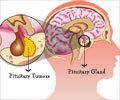Q: Which doctor should I consult if I had a recent head injury or radiation treatment and have symptoms of hypopituitarism?
A: If you had a recent head injury or radiation treatment and have symptoms of hypopituitarism such as severe headache, drop in blood pressure, visual disturbances and confusion, then you should immediately consult an endocrinologist or a neurologist.
Q: What is the long-term outlook for a person with hypopituitarism?
A: One can expect a normal life span, as long as the person takes the medications recommended by the doctor regularly.
Q: What are the side effects of hormone replacement used for treating hypopituitarism?
A: Higher doses of hormones especially cortisol may have harmful effects on the heart, bones (osteopenia or osteoporosis), other organs and increased susceptibility to infections. Replacement of GH leads to side effects such as ankle swelling, joint aches, and an increase in blood sugar levels.
Overdose of desmopressin which is a man-made form of vasopressin results in water retention and reduced sodium levels in the blood sometimes leading to seizures.
Q: What are the risks and complications of surgery done to remove pituitary tumors?
A: Pituitary surgery is quite safe but sometimes it leads to leakage of cerebrospinal fluid, meningitis, and damage to other parts of the pituitary affecting the normal hormone production, diabetes insipidus, severe bleeding if a large blood vessel is damaged and visual problems if the nerve that supplies vision near the pituitary gland gets damaged.
Q: Does the testosterone replacement therapy increase the chances of getting prostate cancer?
A: There is no association between testosterone replacement therapy and prostate cancer.










